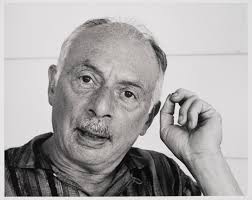
One of the themes running through Gregory Orr’s book, Poetry as Survival, is the role of trauma and adversity in the creative process. The “survival” in Orr’s title speaks to the lyric poet’s need to make sense of past difficulty, hardship, and pain.
One poet who Orr quotes is Stanley Kunitz. In the first, more famous poem—“The Portrait”—an unfortunate family dynamic, a fateful triangle, is the topic, as Kunitz recalls discovering a portrait of his father, who committed suicide, in the attic. When his mother discovers her son’s find, her reaction is unexpectedly brutal:
“The Portrait”
by Stanley Kunitz
My mother never forgave my father
for killing himself,
especially at such an awkward time
and in a public park,
that spring
when I was waiting to be born.
She locked his name
in her deepest cabinet
and would not let him out,
though I could hear him thumping.
When I came down from the attic
with the pastel portrait in my hand
of a long-lipped stranger
with a brave moustache
and deep brown level eyes,
she ripped it into shreds
without a single word
and slapped me hard.
In my sixty-fourth year
I can feel my cheek
still burning.
The poem’s dramatic moment comes at the end where son, like the father, absorbs the sting of living with his mother, though certainly in less permanent fashion. How perfect that the speaker shares “In my sixty-fourth year / I can feel my cheek / still burning.” How perfect, too, that Kunitz resists the unnecessary word “still” before “feel” in the penultimate line. Good poetry is always cut to the bone.
Kunitz also wrote about the pain of anti-Semitism. In the first line of “An Old Cracked Tune,” he lifts a line used in a taunting jingle he often endured as a youth. Here we have a sting of another sort, a cheek still burning from the slap of prejudice. A cheek burning with anger, resentment, and yes, determination:
“An Old Cracked Tune”
by Stanley Kunitz
My name is Solomon Levi,
the desert is my home,
my mother’s breast was thorny,
and father I had none.
The sands whispered, Be separate,
the stones taught me, Be hard.
I dance, for the joy of surviving,
on the edge of the road.
Here is a video of Kunitz reading this brief poem. It is easy to see the Muse’s role in survival. Pounding the disorder of pain into the order of a lyric poem can be powerful medicine. Consider it, as you look to the thickets of your own past….